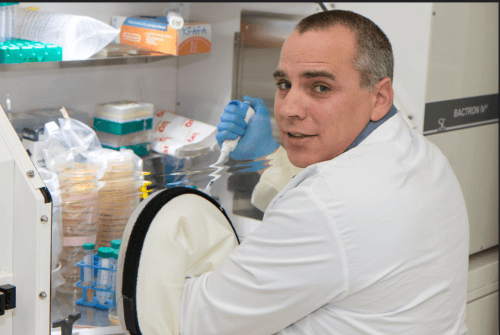The research on the microbiome of pregnant women will be presented at a conference in Bar Ilan that will bring together the scientific development on the subject

This coming Thursday, the Microbiome Israel 2019 conference named after the late Eli Horvitz will be held at the Faculty of Medicine of Bar Ilan University in Safed. Dr. Omri Koren, an international microbiome expert, will present at the conference new research proving that pregnancy is safe for women with inflammatory bowel disease. Inflammatory bowel disease (IBD) is a super term that includes conditions such as ulcerative colitis (UC) and Crohn's disease (CD), which are characterized by chronic inflammation of the digestive tract. IBD is a disease that millions of people worldwide suffer from.
The common concern among women with IBD is how pregnancy will affect the course of the disease, and conversely, how the disease will affect the pregnancy and the health of the fetus. We have good news for these women. A new international study has shown that pregnancy is safe and can even have a positive effect on inflammatory bowel disease.
The study was conducted by researchers from the Azrieli Faculty of Medicine at Bar-Ilan University in Israel who specialize in the study of the microbiome during pregnancy, in collaboration with experts on the immunological aspects of IBD in pregnancy from the University Medical Center in Rotterdam in the Netherlands. The results were recently published in the scientific journal GUT.
Because it is known that cytokine levels (indicators of inflammation patterns) behave differently in people with IBD compared to healthy people, the researchers compared the cytokine patterns and the microbiome in the feces of pregnant women with IBD compared to healthy pregnant women. The stool samples were collected from a cohort of 46 women with IBD (31 with Crohn's disease and 15 with inflammatory bowel disease) and from 170 healthy women who served as controls at different time points before, during and after pregnancy.
The healthy women demonstrated pregnancy-related changes in serum cytokine levels in each trimester of pregnancy, and these were not observed in the pregnant women who had IBD. In pregnant women with IBD, these levels were significantly reduced after conception. This suggests that pregnancy reduces the immunological parameters of inflammation in IBD patients. During the pregnancy itself, the cytokine levels in the serum of IBD patients remained quite stable, sometimes even slightly lower than those of the control cases, throughout the three trimesters of pregnancy. In general, it therefore seems that the immune status of IBD patients improves during pregnancy. In addition, although the diversity of the microbiome was less in IBD patients compared to healthy women before and in the early stages of pregnancy, it became normal in the middle and late stages of pregnancy.
One of the main characteristics of the microbiome in this disease and during pregnancy is the variety of bacterial species. The comparison of the microbiome between the healthy women and IBD patients showed less variation and more similarity among the patients compared to the healthy women who served as controls. A lower tendency for bacterial richness among IBD patients has already been reported in the past, and this finding was expected. "However, we found to our surprise that the microbiome in IBD patients was similar between them, which indicates that certain species disappear during the course of the disease in most patients" - says Dr. Amri Koren, director of the microbiome research laboratory of the Azrieli Faculty of Medicine at Bar-Ilan University , who led the study. We have already shown before that during the pregnancy of healthy women, the variety of bacterial species decreases. The fact that there was a difference between the diversity of bacteria between IBD patients and the control cases of the healthy women in early pregnancy, but this difference decreased in the more advanced stages of pregnancy indicates that pregnancy in IBD patients is not accompanied by a further reduction of the diversity beyond the composition of the bacteria in the microbiome that is already present in these patients. "
Similar results have been demonstrated for Crohn's disease and inflammatory bowel disease, showing that the immune system is not subject to change, but the microbiome is. Crohn's disease and inflammatory bowel disease had different microbiomes before and during pregnancy, but as pregnancy progressed there was a reduction in diversity in these two conditions, which is also what is known about normal pregnancy in healthy women. Prof. Yoram Luzon from Bar-Ilan University's mathematics department helped create a dynamic mathematical model that allows understanding how the changes at the beginning of pregnancy affect the microbiome and the changes in cytokines at the end of pregnancy.
Pregnancy affects many physiological processes; These are disrupted in IBD, but until now very little was clear about the immune and bacterial signatures in these pregnant patients. "This is the first time that samples have been compared with samples from healthy women before, during and after pregnancy." - says Dr. Koren. "From an immunological and microbiological point of view, pregnancy in IBD patients is a beneficial event."

2 תגובות
Another important question is what happens with the state of the disease after birth, with the state of the cytokines and the microbiome. Is there disease recurrence in most cases after birth? Or does the improvement of the pregnancy remain and help?
You should read the thirty-six hours from Immoran